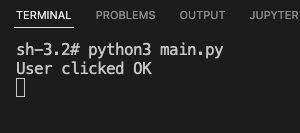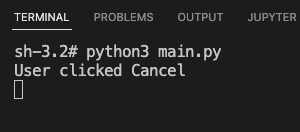Tkinter messagebox - Ask OK or Cancel
Tkinter messagebox – Ask OK or Cancel
In Tkinter, the messagebox.askokcancel() method is used to ask the user a question if an operation should proceed with two actions: OK, Cancel.

If user clicks on OK button, then askokcancel() returns True, or else if user clicks on Cancel button, then askokcancel() returns False. Based on the returned value, we can proceed with the required logic.
In this tutorial, you will learn how to ask a question in a message box using messagebox.askokcancel() method in Tkinter, with an example program.
Syntax of messagebox.askokcancel()
The syntax of askokcancel() method is
messagebox.askokcancel(title, message)where
| Parameter | Description |
|---|---|
| title | This string is displayed as title of the messagebox. [How a title is displayed in message box depends on the Operating System. ] |
| message | This string is displayed as a message inside the message box. |
Examples
1. Ask if user want to proceed with the operation
For example, consider that you have created a GUI application using Python Tkinter, and you would like to ask the user a question: Do you want to proceed?
You can ask the question with OK or Cancel actions in a messagebox, as shown in the following code.
Python Program
import tkinter as tk
from tkinter import messagebox
# Create the main window
window = tk.Tk()
# Ask for confirmation: OK or Cancel
result = messagebox.askokcancel("Confirmation", "Do you want to proceed?")
if result:
print("User clicked OK")
else:
print("User clicked Cancel")
# Run the application
window.mainloop()After user takes an action by clicking on either of the buttons, the return value is stored in result variable. Based on this value, we print an output.
Output
In Windows
In MacOS

If user clicks on OK button, then we get the following output in Terminal.

If user clicks on Cancel button, then we get the following output in Terminal.

Summary
In this Python Tkinter tutorial, we learned how to ask a question with OK and Cancel actions in a message box in Tkinter, with examples.